Military Counseling & Helping Veterans Deal With Trauma
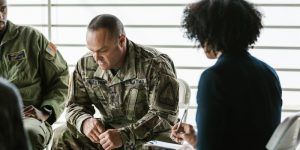 The military has a varied task force.
The military has a varied task force.
You don’t have to become a soldier; there are many possibilities for more unusual jobs.
For instance, there are excellent opportunities for military counselors.
The size of the military in the United States is vast. In fiscal year 2020, the U.S. Army counted among its service members 1,005,725 soldiers (United States Army, 2021). This includes active soldiers only; with veterans and families added into the equation, the actual figure is even higher.
As military culture differs significantly from civilian life, service members and their families can experience considerable military-specific difficulties (Hall, 2016). There is great demand for counselors who are trained within this culture.
If you want to know more about this exciting role, please read on. You may decide by the end of this article that it is just the right job for you.
Before you continue, we thought you might like to download our three Positive Psychology Exercises for free. These science-based exercises will explore fundamental aspects of positive psychology including strengths, values, and self-compassion, and will give you the tools to enhance the wellbeing of your clients, students, or employees.
This Article Contains:
- What Is Military Counseling? 4 Real-Life Examples
- How to Use Psychology to Help Veterans & Soldiers
- Requirements of a Military Counselor
- Training in Military Therapy: 2 Certificates
- 2 Best Programs to Consider
- Helpful Forms and Checklists for Your Sessions
- Top 3 Books on the Topic
- PositivePsychology.com’s Resources
- A Take-Home Message
- References
What Is Military Counseling? 4 Real-Life Examples
Military counseling focuses on active service members and personnel, veterans, and military families (Forziat, Arcuri, & Erb, 2017).
The role of a military counselor is to provide support to active service members and veterans who may suffer from post-traumatic stress disorder (PTSD), depression, anxiety, substance misuse problems, and self-harm from their experiences in the military (Exum, Coll, & Weiss, 2011).
Military counselors also help families who are facing difficulties. Relocation adjustments and marriage problems can be rife in this group (Beasley, MacDermid Wadsworth, & Watts, 2012).
1. Mental health disorders
Mental health issues commonly seen in the military population include PTSD, depression, and anxiety. These mental health issues are also seen in the general population, but the circumstances of military culture, such as combat and deployment, mean the risk factors are increased (Booth-Kewley, Larson, Highfill-McRoy, Garland, & Gaskin, 2010; Maguen et al., 2011).
Soldiers who return from a mission may often be diagnosed with PTSD (Falsetti & Resick, 1995). One such case was ‘Jared,’ a 36-year-old married service member returning from Afghanistan. He joined the army at the age of 20 (American Psychiatric Association, n.d.).
A few weeks after arriving in Afghanistan, a comrade was killed. After that, Jared’s personality changed. Later on, Jared was guarding a gate in the military and dosed off. An enemy mortar round sounded violently. It terrified him.
Jared began to feel ‘easily triggered.’ He attended a specialist clinic for veterans with military counseling services and described trouble controlling his rage, frequent arguments, intrusive thoughts about death, nightmares, anxiety, and anhedonia (loss of pleasure). This was highly distressing for Jared. He kept a handgun for protection, as he thought someone may harm him. Although he did not intend to harm anyone, he worried he may accidentally do so.
Jared was diagnosed with PTSD at the clinic and provided with specialist counseling. In this instance, a military counselor would have understood Jared’s mental health difficulties in the context of his military work.
2. Substance use disorders
All types of substance use disorders are seen in the military, from alcohol overuse to illicit drug use, including prescription drugs (Forziat et al., 2017).
In the United Kingdom, the leading veteran’s mental health charity, Combat Stress, has undertaken research into former service members (Murphy, Palmer, Westwood, Busuttil, & Greenberg, 2016). The study compared alcohol misuse between veterans and the general population over 18 months. They noticed that veterans presented at the hospital with physical health problems before being referred for alcohol support and counseling.
A veteran substance misuse case management service was piloted in various locations across the United Kingdom. This has helped veterans access specific counseling services to assist them with substance misuse, support abstinence, and prevent relapse.
3. Deployment
Military service brings deployment stressors (Beasley et al., 2012). As service members separate from civilian culture, they adopt new social norms and class structures in military culture (Hall, 2016).
They experience a mix of emotions such as anxiety, anger, excitement, confusion, and even ambivalence (Hall, 2016). Returning from deployment and readjusting to home life can also be stressful for service members (Sayer et al., 2010). They can feel isolated, experience disrespect from civilians, feel misunderstood, and generally struggle with the transition (Demers, 2011).
A case study examining the rekindling of marriage after combat deployment in five couples showed negative emotions and feelings of a changed reality, especially in couples where one or both partners had been diagnosed with PTSD (Melvin, Wenzel, & Jennings, 2015).
The findings from this study strongly suggest that counseling interventions focusing on military couples are needed to promote their relationship (Melvin et al., 2015). Once again, this is a niche area for military counselors. You can address specific military culture-related marital difficulties and promote a strong relationship.
4. Relocation and family stress
Military families relocate more frequently than civilian families because of one or both parents being in the military (U.S. Department of Defense, 2010).
The children of military families face a unique set of stressors, including establishing peer relationships (Kelley, Finkel, & Ashby, 2003), conflict within intergenerational relationships (Lowe, Adams, Browne, & Hinkle, 2012), multiple school transitions, and academic demands (Engel, Gallagher, & Lyle, 2010).
This is where a military counselor can step in. Military OneSource is an organization that provides a specific service to children and adolescents in military families. They have counselors who are licensed in military and family life counseling to help children and adolescents with general behavior, school, and relationships with family and peers (Military OneSource, 2020a).
How to Use Psychology to Help Veterans & Soldiers

Military couples counseling
If you would like to work as a military counselor, you may help couples with relationship difficulties embedded within the military culture. The problems may be related to ongoing trauma. Or, they may be psychological or relationship issues caused by the transition from deployment to civilian life (Military OneSource, 2020c).
A military counselor helps couples enhance their communication skills (Military OneSource, 2019). Military OneSource (2019) has specially trained military couples counselors who offer counseling to couples. In the United Kingdom, such counseling can be obtained through a referral from the Army Welfare Service (Army, n.d.).
Military grief counseling explained
A military counselor will often need to counsel individuals or families who have experienced grief and loss in tragic circumstances (Hall, 2016). This is not uncommon, given the military culture and the proximity its members often have to death (Maguen et al., 2011).
As a military counselor, you can help support the family of a deceased service member through one-to-one counseling. The U.S. Department of Veterans Affairs Bereavement Counseling supports family members overwhelmed by grief (Military OneSource, 2020b).
The death of a parent can be very difficult for children (Military OneSource, 2020b). Several groups help grieving children and are run by military counselors. These are Comfort Zone Camp, the Dougy Center, SOFWOLF, Project Common Bond, and Snowball Express (Military OneSource, 2020b). You may wish to work in one of these or a similar organization.
75% of respondents in a survey found it essential for a military counselor to have an understanding of military culture (Hill & Ponton, 2023).
Requirements of a Military Counselor
The requirements of a military counselor vary and depend on whether you are working with individuals, couples, or families (Moore, 2011). Your ultimate goal will be to help veterans, active duty service members, and their families cope more effectively and lead healthier and more productive lives (Hall, 2016).
A military counselor performs health assessments often using psychological tests (Council for the Accreditation of Counseling and Related Educational Programs, 2016). You will teach active service members and veterans strategies to reduce stress and improve coping for those suffering from PTSD, anxiety, depression, and other mental health issues (Daniels, 2013).
As a military counselor, you will administer readjustment counseling to address relationship difficulties for individuals and families transitioning from deployment to civilian life (Hall, 2016).
At times, you may counsel individuals or families dealing with grief, loss, and tragedy (Hall, 2016). If more intensive treatment is required, you can refer someone for additional treatment (Moore, 2011).
Training in Military Therapy: 2 Certificates

You will also need to gain experience working in the military. Internships or other work experience may help you obtain the licensing requirements necessary (Council for the Accreditation of Counseling and Related Educational Programs, 2016).
There are different ways you can gain certifications and degrees. Here are some relevant certification options.
Clinical Military Counselor Certificate
The Clinical Military Counselor Certificate is an online, self-study, 12-hour course. It is aimed at professionals who are already trained counselors and need further training in this field.
There are practice guidelines and a training manual, five training modules, videotaped presentations, and written materials to guide counselors. The course covers assessment, diagnosis, and treatment of those in or associated with the military.
Find out more on Military Counseling Training.
Graduate Certificate in Military Resilience
The Graduate Certificate in Military Resilience is designed to equip you to assess trauma. It provides you with counseling and mental health support tools.
The certificate can be combined with other certificates to gain further credits for a fuller degree, or it can be used as a standalone module for counselors. It is an online course, accredited by Liberty University.
Find out more at Liberty Online.
2 Best Programs to Consider
To become a qualified military counselor, you need an accredited master’s degree in counseling, focusing on active military or veterans counseling.
Master of Education
The William & Mary School of Education offers an online Master of Education (MEd) accredited by the Council for the Accreditation of Counseling and Related Educational Programs that focuses on clinical mental health counseling and a specialization in active military and veterans counseling.
This will supplement a counseling degree and can take three years in total (both degrees). Internship experiences will allow you to apply your knowledge and skills with active military and veteran clients.
Find out more at William & Mary School of Education.
Masters in Human Services
The Masters in Human Services – Military Counseling Degree is a one-year 100%-online master’s degree. Students will understand more about stress and trauma and learn how to help families and support veterans.
It is ideal if you want additional training or are entering military counseling for the first time. You will need to gain further practical experience before entering a military counseling career.
Find out more at Liberty University.
Helpful Forms and Checklists for Your Sessions
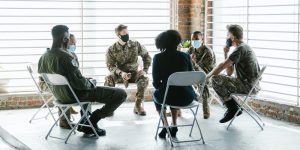
1. PCL-5
As a military counselor, you will often screen for trauma and PTSD.
The PCL-5 (Weathers et al., 2013) is a 20-item self-report checklist of PTSD symptoms based closely on the criteria in the Diagnostic and Statistical Manual of Mental Disorders. Each item is rated from 0 (“not at all”) to 4 (“extremely”) to indicate the severity of a symptom.
It is a quick screening tool and takes a few minutes to complete. The psychological symptoms can then be addressed in the counseling sessions. You can monitor the client’s change over time by obtaining an initial score and repeating the measure during the course of treatment.
You can find a copy of the full scale at the National Center for PTSD.
2. The Relationships Dynamics Scale
The Relationships Dynamics Scale (Markman, Stanley, & Blumberg, 1994) assesses commitment and negative communication patterns in a relationship. It can be used with both partners as part of the counseling process.
There is a three-point scale and a total score. A higher score indicates more conflict in the relationship, and arising difficulties can be addressed in sessions.
You can find a copy of the full scale at York University’s Psychology Resource Centre.
3. A Toolkit for the Well Child Screening of Military Children
The Toolkit for the Well Child Screening of Military Children (Rauch, Ohye, Bostic, & Masek, 2012) has several valuable screening tools and is designed for children in military families. It can act as a valuable toolbox of forms, checklists, and resources for parents if a child is having difficulties.
The 35-item pediatric symptom checklist is available in different formats for children and adolescents. The total score shows whether or not there is psychosocial impairment. If you are working as a military counselor, you can use the checklists in your assessments and the resources to help parents.
You can find a copy of the materials as a public online resource on many mental health and pediatric sites.
Top 3 Books on the Topic
Several books can be helpful for anyone wishing to pursue a career in military psychology. The information you will learn about active service members, veterans, and families will be invaluable in your work as a military counselor.
1. Counseling Military Families – Lynn K. Hall
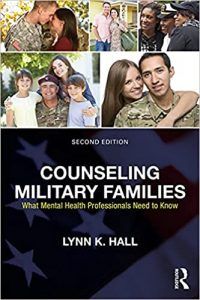
There are specific chapters on the unique conditions for reservists, personnel, partners, and children. There is a particular chapter on treatment models and targeted interventions.
The book is most useful for transitioning families and those who resist seeking help.
Find the book on Amazon.
2. When Your Dad Goes to War – Maryann Makekau
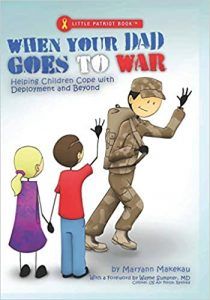
Part of the Little Patriot Books series, this book is about the loss of a parent through war and deployment.
It is aimed at children and allows them to understand their feelings about their parent’s deployment.
Find the book on Amazon.
3. Handbook of Counseling Military Couples – Bret A. Moore
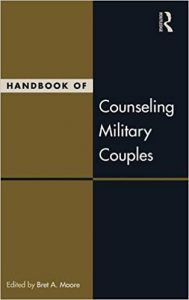
It highlights couples’ relationships in the military and provides outlines to health professionals on how to address them.
In addition, the book also looks at marriage and divorce in military couples and compares them to civilian couples.
Find the book on Amazon.
PositivePsychology.com’s Resources
There are several worksheets, activities, and a masterclass that you will find beneficial in your work as a military counselor.
The following are some resources to help you work with some of the common challenges faced by military personnel and better tailor the support you provide:
- Realizing Resilience Masterclass©
This six-module resilience training template can help service members, their partners, and their children deal with challenges and build up their resilience. - Growing Stronger From Trauma
This worksheet helps clients explore the silver linings of traumatic experiences while appreciating the strengths they have developed as a result. - Preventing Mental Health Relapse
This worksheet can help military clients track the symptoms of mental health conditions, recognize triggers and relapse warning signs, and develop preventative coping mechanisms. - What is Working Within the Family?
This activity can help service members and their families identify and share what they feel goes well within the family or household as a means to celebrate and build on successes. - Resolving Marital Conflicts
This worksheet presents a series of questions exploring recurring conflicts that arise within a relationship and gives partners a chance to evaluate present and possible coping strategies for addressing them.
If you’re looking for more science-based ways to help others enhance their wellbeing, this signature collection contains 17 validated positive psychology tools for practitioners. Use them to help others flourish and thrive.
A Take-Home Message
Military counseling can be a fulfilling career if you wish to venture into this line of work. This specific population is regularly in need of support and assistance with specialist counseling services.
The route to becoming a military counselor is somewhat flexible. Generally, undertaking a psychology or counseling degree is an essential foundation. An additional component of military counseling as a supplemental certificate, degree, or program is required. You will also need to gain some work experience to implement your theoretical knowledge into practice.
To see if this career path is ideal for you, the recommended counseling books are worth a read, as you will gain valuable insight into this career. You will learn about the dynamics and specifics of this population of clients.
If you decide to enter the military counseling field, you may find it very rewarding, knowing you have a positive influence on a vital component of your country.
We hope you enjoyed reading this article. Don’t forget to download our three Positive Psychology Exercises for free.
- American Psychiatric Association. (n.d.). Patient story: PTSD. Retrieved June 15, 2021, from https://www.psychiatry.org/patients-families/ptsd/patient-story
- Army. (n.d.). People relationship breakdown. Retrieved June 16, 2021, from https://www.army.mod.uk/people/support-well/relationship-breakdown/
- Beasley, K. S., MacDermid Wadsworth, S. M., & Watts, J. B. (2012). Transitioning to and from deployment. In D. K. Snyder & C. M. Monson (Eds.), Couple-based interventions for military and veteran families: A practitioner’s guide (pp. 47–62). Guilford Press.
- Booth-Kewley, S., Larson, G., Highfill-McRoy, R., Garland, C., & Gaskin, T. (2010). Correlates of post-traumatic stress disorder symptoms in Marines back from war. Journal of Traumatic Stress, 23(1), 69–77.
- Council for the Accreditation of Counseling and Related Educational Programs. (2016). 2016 CACREP standards. Retrieved June 13, 2021, from https://www.cacrep.org/for-programs/2016-cacrep-standards/
- Daniels, L. R. (2013). Grief and traumatic stress: Conceptualizations and counseling services for veterans. In K. J. Doka & A. S. Tucci (Eds.), Improving care for veterans facing illness and death (pp. 85–93). Hospice Foundation of America.
- Demers, A. (2011). When veterans return: The role of community in reintegration. Journal of Loss & Trauma, 16(2), 160–179.
- Engel, R. C., Gallagher, L. B., & Lyle, D. S. (2010). Military deployments and children’s academic achievement: Evidence from Department of Defense education activity schools. Economics of Education Review, 29(1), 73–82.
- Exum, H. E., Coll, J. E., & Weiss, E. L. (2011). A civilian counselor’s primer for counseling veterans (2nd ed.). Linus.
- Falsetti, S., & Resick, P. (1995). Causal attributions, depression, and post-traumatic stress disorder in victims of crime. Journal of Applied Social Psychology, 25, 1027–1042.
- Forziat, K. E., Arcuri, N. M., & Erb, C. (2017). Counseling the military population: The factor of prior military exposure for counselors-in-training. The Journal of Counselor Preparation and Supervision, 10(1), 1–34.
- Hall, L. K. (2016). Counseling military families (2nd ed.). Routledge.
- Hill & Ponton. (2023, August 28). The Silent Battle: Fostering Accessibility and Support for Veteran Mental Health Care from https://www.hillandponton.com/veterans-mental-healthcare-treatment-research/
- Kelley, M. L., Finkel, L. B., & Ashby, J. (2003). Geographic mobility, family, and maternal variables as related to the psychosocial adjustment of military children. Military Medicine, 168, 1019–1024.
- Lowe, K. N., Adams, K. S., Browne, B. L., & Hinkle, K. T. (2012). Impact of military deployment on family relationships. Journal of Family Studies, 18(1), 17–27.
- Maguen, S., Vogt, D., King, D., Litz, B., Knight, S., & Marmar, C. (2011). The impact of killing on mental health symptoms in Gulf War veterans. Psychological Trauma-Theory Research Practice and Policy, 3(1), 21–26.
- Makekau, M. (2010). When your dad goes to war: Helping children cope with deployment and beyond. Author.
- Markman, H. J., Stanley, S. M. & Blumberg, S. L. (1994). Fighting for your marriage: Positive steps for a loving and lasting relationship. Jossey Bass.
- Melvin, K. C., Wenzel, J., & Jennings, B. M. (2015). Strong Army couples: A case study of rekindling marriage after combat deployment. Research in Nursing & Health, 38(1), 7–18.
- Military OneSource. (2019, November 21). Make your marriage stronger. Retrieved June 15, 2021, from https://www.militaryonesource.mil/confidential-help/non-medical-counseling/military-and-family-life-counseling/make-your-marriage-stronger/
- Military OneSource. (2020a, February 6). Child and youth behavioral military and family life counselors. Retrieved June 21, 2021, from https://www.militaryonesource.mil/confidential-help/non-medical-counseling/military-and-family-life-counseling/child-and-youth-behavioral-military-and-family-life-counselors/
- Military OneSource. (2020b, November 3). Bereavement camps: An opportunity to grieve and heal. Retrieved June 21, 2021, from https://www.militaryonesource.mil/family-relationships/gold-star-surviving-family/understanding-grief/bereavement-camps-an-opportunity-to-grieve-and-heal/
- Military OneSource. (2020c, November 25). Military separation: What to expect when your service member transitions to civilian life. Retrieved July 15, 2021, from https://www.militaryonesource.mil/military-life-cycle/friends-extended-family/military-separation-transitioning-to-civilian-life/
- Moore, B. A. (2011). Handbook of counseling military couples. Routledge.
- Murphy, D., Palmer, E., Westwood, G., Busuttil, W. & Greenberg, N. (2016). Do alcohol misuse, service utilisation, and demographic characteristics differ between U.K. veterans and members of the general public attending an NHS general hospital? Journal of Clinical Medicine, 5(11), 95.
- Rauch, P., Ohye, B., Bostic, J., & Masek, B. (2012). A toolkit for the well child screening of military children. The Home Base Program. Retrieved June 15, 2021, from https://web.jhu.edu/pedmentalhealth/images/NNCPAP%20files/Military%20Children%20Dec%2015%20USE.pdf
- Sayer, N., Noorbaloochi, S., Frazier, P., Carlson, K., Gravely, A., & Murdoch, M. (2010). Reintegration problems and treatment interests among Iraq and Afghanistan combat veterans receiving V.A. medical care. Psychiatric Services, 61(6), 589–597.
- United States Army. (2021). In Wikipedia. Retrieved July 20, 2021.
- U.S. Department of Defense. (2010). Demographics, 2010: Profile of the military community annual report. Retrieved June 13, 2021, from https://download.militaryonesource.mil/12038/MOS/Reports/2010-Demographics-Report.pdf
- Weathers, F. W., Litz, B. T., Keane, T. M., Palmieri, P. A., Marx, B. P., & Schnurr, P. P. (2013). The PTSD checklist for DSM-5 (PCL-5). U.S. Department of Veterans Affairs. Retrieved June 15, 2021, from https://www.ptsd.va.gov/professional/assessment/adult-sr/ptsd-checklist.asp
Let us know your thoughts
Read other articles by their category
- Body & Brain (50)
- Coaching & Application (57)
- Compassion (26)
- Counseling (51)
- Emotional Intelligence (24)
- Gratitude (18)
- Grief & Bereavement (21)
- Happiness & SWB (40)
- Meaning & Values (26)
- Meditation (20)
- Mindfulness (45)
- Motivation & Goals (45)
- Optimism & Mindset (34)
- Positive CBT (29)
- Positive Communication (20)
- Positive Education (47)
- Positive Emotions (33)
- Positive Leadership (18)
- Positive Parenting (4)
- Positive Psychology (33)
- Positive Workplace (37)
- Productivity (17)
- Relationships (46)
- Resilience & Coping (38)
- Self Awareness (21)
- Self Esteem (38)
- Strengths & Virtues (32)
- Stress & Burnout Prevention (34)
- Theory & Books (46)
- Therapy Exercises (37)
- Types of Therapy (64)
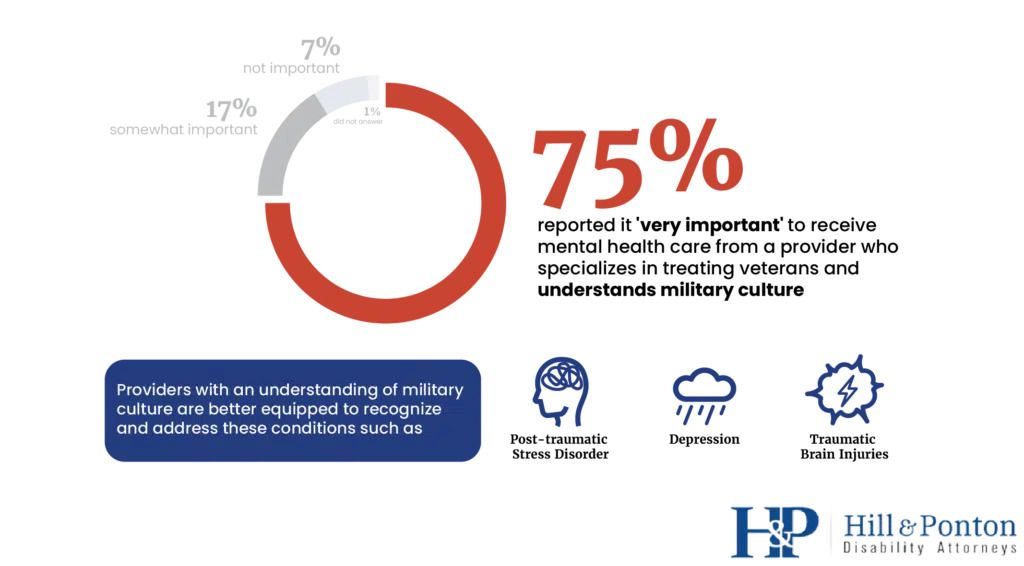

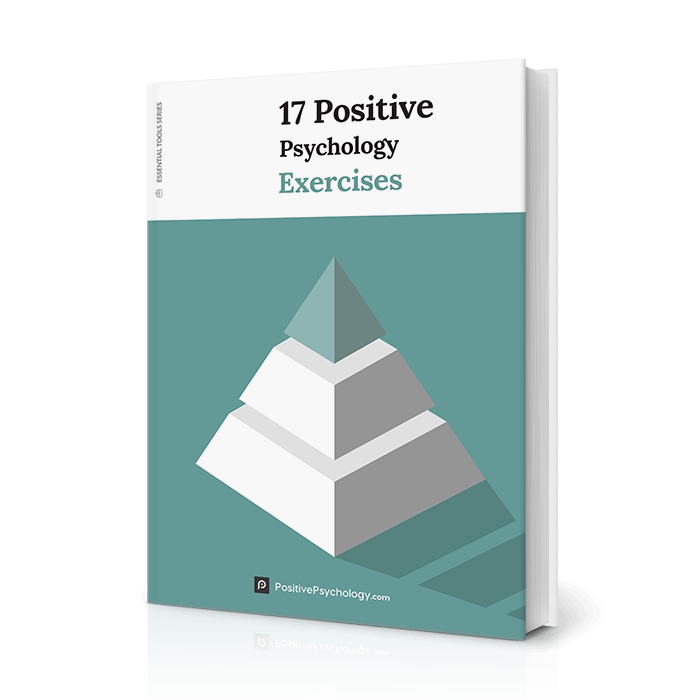



What our readers think
Hello there,
I am a Canadian Veteran – live in Toronto/Canada. And Your online resources is very helpful resource for injured & non injured military/veterans.
Kind regards and thank you,
Biplob
Hello Biplob,
Thank you so much for your kind words. We are glad our resources could be of help. Wishing you all the best!
Warm regards,
Julia | Community Manager